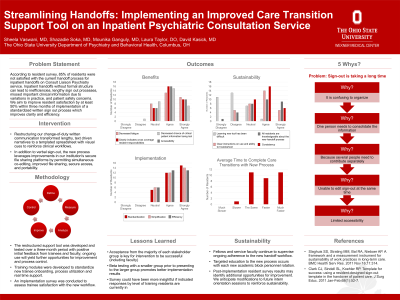Quality and Safety
Session: Poster Session
(169) Streamlining Handoffs: Implementing an Improved Care Transition Support Tool on an Inpatient Psychiatric Consultation Service

Trainee Involvement: Yes

Sheela Vaswani, MD (she/her/hers)
Resident Physician
The Ohio State University Wexner Medical Center
Columbus, Ohio, United States.jpg)
David Kasick, MD, DFAPA, FACLP
Professor of Clinical Psychiatry and Behavioral Health
The Ohio State University Wexner Medical Center
Columbus, Ohio, United States- LT
Laura Taylor, DO
assistant professor
Ohio State University
Columbus, Ohio, United States 
Shazadie Soka, MD
Consultation Liaison Psychiatry Fellow
The Ohio State University Wexner Medical Center
Columbus, Ohio, United States- MG
Mounika Ganguly, MD
Consultation-Liaison Psychiatry Fellow
The Ohio State University
Columbus, Ohio, United States
Presenting Author(s)
Co-Author(s)
Methods: Using a DMAIC quality improvement approach, the CL Psychiatry change-of-duty written communication at our institution was restructured from a lengthy, text driven narrative format to a templated spreadsheet with visual cues to reinforce focused clinical workflows. In addition to verbal sign-out, this new process leveraged upgrades to our institution's secure file sharing platforms by permitting simultaneous co-editing, improved file sharing, secure access, and portability. The new support tool was developed and tested over a three-month period with ongoing continued use based on positive initial feedback from trainees and faculty. Training modules were developed to standardize new trainee onboarding, process utilization, and real time support.
Background: Patient care change-of-duty handovers can create issues with communication breakdown, increased medical errors, and longer hospital stays (Clark et al, 2011). Furthermore, understanding factors associated with satisfaction at work in academic centers is important for physician retention, decreased risk of burnout and increased organizational performance (Simpkin et al, 2019). This quality improvement project was aimed towards implementing a simplified and standardized sign-out process to improve efficiency of hand off communication and trainee satisfaction during evening and weekend change-of-duty care transitions.
Results: An implementation survey was conducted to assess trainee satisfaction with the new workflow. Outcomes measures included standardization, accessibility, efficiency, and simplification of the new sign out process. Additional measures included if the hand-off tool clearly indicated responsibilities, decreased fatigue, resident knowledge and understanding of new sign out process and average time to complete new process. An analysis of data gathered from the survey will be presented.
Discussion: Based on our preliminary data, this quality improvement project improved trainee satisfaction surrounding CL Psychiatry cross-coverage transitions. Trainees found the new electronic sign-out process more efficient and accessible. This initiative also demonstrated that acceptance by the majority of the intervention group was key in supporting a successful workflow change. Future sustainability surveys could offer additional insight into response trends by capturing resident level of training. We anticipate modifications to future intern orientation sessions to reinforce sustainability. Fellows and service faculty continue to supervise ongoing adherence to the new handoff workflow.
Conclusion: Trainee stakeholder-driven care transition QI projects align well with the ACGME’s emphasis on resident and fellow engagement in developing and implementing strategies to improve the clinical learning environment. Successful workflow changes on busy consultation teams with rotating learners can be supported by post-implementation surveys and targeted workflow education at the start of each new academic block. Inpatient CL teams can offer an ideal setting for applying quality improvement methods that support enhanced patient care and increased trainee satisfaction.
References:
1. Clark CJ, Sindell SL, Koehler RP. Template for success: using a resident-designed sign-out template in the handover of patient care. J Surg Educ. 2011 Jan-Feb;68(1):52-7. doi: 10.1016/j.jsurg.2010.09.001. PMID: 21292216.
2. Simpkin AL, Chang Y, Yu L, Campbell EG, Armstrong K, Walensky RP. Assessment of Job Satisfaction and Feeling Valued in Academic Medicine. JAMA Intern Med. 2019 Jul 1;179(7):992-994. doi: 10.1001/jamainternmed.2019.0377. PMID: 31058983; PMCID: PMC6503555.

